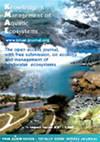Mislabelling may explain why some prohibited invasive aquatic plants are still being sold in Belgium
IF 1.7
3区 环境科学与生态学
Q3 FISHERIES
引用次数: 3
Abstract
In Belgium, a voluntary code of conduct intended to prevent introduction of invasive plants through the horticultural trade has been implemented since 2009. European Regulation 1143/2014 that imposes legal bans on a number of plant taxa entered into force in 2015. However, studies regarding the presence of invasive plants in the Belgian horticultural trade remained scarce. In 2016–2017 and in 2020, we surveyed a total of 11 garden centres specialized in water gardening and compiled a list of 285 aquatic plant taxa that were being traded. In 2020, four Belgian Consensus List species and one Communication List species were still offered for sale. Also, three species of Union Concern were still being sold in 2020. The plants of the Belgian Lists that were still being sold in 2020 and all except one of the European Union List plants were mislabelled, either because of misidentification or because a taxonomic synonym was used. Mislabelling may explain why some prohibited plants were still in trade. Therefore, retailers and plant producers should be encouraged to correctly identify the plants that are being traded. Our study illustrates that regular surveys are essential to assess the effectiveness of voluntary codes of conduct and legal trade bans.错误的标签可能解释了为什么一些被禁止的入侵水生植物仍在比利时出售
自2009年以来,比利时实施了一项旨在防止通过园艺贸易引入入侵植物的自愿行为准则。2015年生效的欧洲法规1143/2014对一些植物分类群实施了法律禁令。然而,关于入侵植物在比利时园艺贸易中的存在的研究仍然很少。在2016-2017年和2020年,我们调查了11个专门从事水上园艺的花园中心,并编制了285个正在交易的水生植物分类群的清单。到2020年,仍有四种比利时共识清单物种和一种交流清单物种可供出售。此外,到2020年,仍有三种Union Concern仍在出售。比利时名单上的植物在2020年仍在销售,除了一种欧盟名单上的植物外,其他所有植物都贴错了标签,要么是因为识别错误,要么是因为使用了分类学上的同义词。错误的标签可能解释了为什么一些被禁止的植物仍在交易。因此,应该鼓励零售商和植物生产商正确识别正在交易的植物。我们的研究表明,定期调查对于评估自愿行为准则和合法贸易禁令的有效性至关重要。
本文章由计算机程序翻译,如有差异,请以英文原文为准。
求助全文
约1分钟内获得全文
求助全文
来源期刊

Knowledge and Management of Aquatic Ecosystems
环境科学-海洋与淡水生物学
CiteScore
3.70
自引率
5.60%
发文量
22
审稿时长
>12 weeks
期刊介绍:
Knowledge and Management of Aquatic Ecosystems (KMAE-Bulletin Français de la Pêche et de la Pisciculture since 1928) serves as a foundation for scientific advice across the broad spectrum of management and conservation issues related to freshwater ecosystems.
The journal publishes articles, short communications, reviews, comments and replies that contribute to a scientific understanding of freshwater ecosystems and the impact of human activities upon these systems. Its scope includes economic, social, and public administration studies, in so far as they are directly concerned with the management of freshwater ecosystems (e.g. European Water Framework Directive, USA Clean Water Act, Canadian Water Quality Guidelines, …) and prove of general interest to freshwater specialists. Papers on insular freshwater ecosystems and on transitional waters are welcome. KMAE is not a preferred journal for taxonomical, physiological, biological, toxicological studies, unless a clear link to ecological aspects can be established. Articles with a very descriptive content can be accepted if they are part of a broader ecological context.
 求助内容:
求助内容: 应助结果提醒方式:
应助结果提醒方式:


